最新初中英语常见错误100例
初中英语语法常见错误排查

初中英语语法常见错误排查一、名词错误1.可数名词与不可数名词的混淆。
2.名词所有格的误用,如“Tom’s book”应为“Tom’s”。
3.复数名词的错误形式,如“books”应为“books”。
二、动词错误1.动词时态的混淆,如将“I am”误用为“I was”。
2.动词语态的误用,如将“He is cleaned”误用为“He cleans”。
3.情态动词的错误使用,如将“Can you”误用为“You can”。
4.被动语态的混淆,如将“The book is read”误用为“The book reads”。
三、代词错误1.人称代词的主谓一致,如“I, me, my”应与主语保持一致。
2.物主代词的误用,如将“my book”误用为“your book”。
3.反身代词的错误使用,如将“She can cook”误用为“She can cook herself”。
四、形容词和副词错误1.形容词和副词的比较级和最高级的混淆,如将“bigger”误用为“biggest”。
2.修饰词和中心词的搭配不当,如将“beautiful girl”误用为“girl beautiful”。
五、冠词错误1.不定冠词“a”和“an”的误用,如将“a university”误用为“an university”。
2.定冠词“the”的错误使用,如将“the book”误用为“book”。
六、介词错误1.介词短语的搭配不当,如将“look after”误用为“look for”。
2.介词位置的错误,如将“in the book”误用为“in book”。
七、连词错误1.并列连词的误用,如将“and”误用为“but”。
2.从属连词的错误使用,如将“because”误用为“why”。
八、句式错误1.疑问句的错误结构,如将“Is he?”误用为“He is?”。
2.否定句的错误结构,如将“He doesn’t have”误用为“He do not have”。
最新初中英语常见错误100例
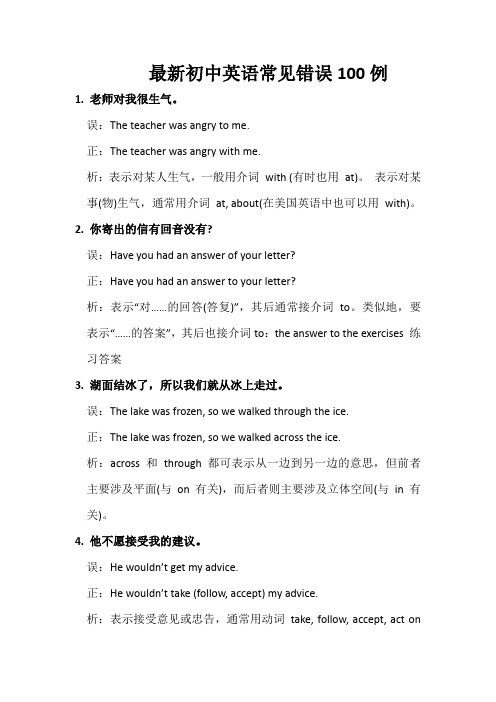
最新初中英语常见错误100例1. 老师对我很生气。
误:The teacher was angry to me.正:The teacher was angry with me.析:表示对某人生气,一般用介词with (有时也用at)。
表示对某事(物)生气,通常用介词at, about(在美国英语中也可以用with)。
2. 你寄出的信有回音没有?误:Have you had an answer of your letter?正:Have you had an answer to your letter?析:表示“对……的回答(答复)”,其后通常接介词to。
类似地,要表示“……的答案”,其后也接介词to:the answer to the exercises 练习答案3. 湖面结冰了,所以我们就从冰上走过。
误:The lake was frozen, so we walked through the ice.正:The lake was frozen, so we walked across the ice.析:across 和through 都可表示从一边到另一边的意思,但前者主要涉及平面(与on有关),而后者则主要涉及立体空间(与in 有关)。
4. 他不愿接受我的建议。
误:He wouldn’t get my advice.正:He wouldn’t take (follow, accept) my advice.析:表示接受意见或忠告,通常用动词take, follow, accept, act on等,但不能用get。
另外:提出建议或忠告,通常用动词give;表示向某人请教或征求意见,一般用动词ask (for)。
5. “你自己能修吗?”“恐怕不行。
”误:“Can you repair it yourself?” “I’m not afraid.”正:“Can you repair it yourself?” “I’m afraid not.”析:比较:I’m not afraid. 意为“我不怕”;I’m afraid not. 意为“恐怕不行”“恐怕不会”“恐怕不是”等(表示委婉的否定)。
初三英语错题和解析100题
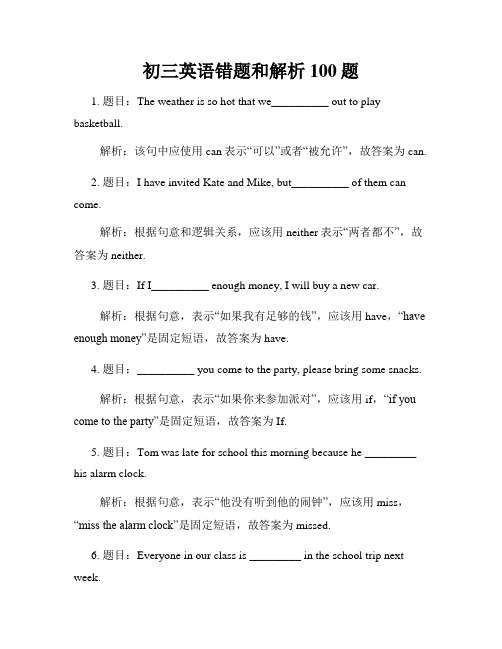
初三英语错题和解析100题1. 题目:The weather is so hot that we__________ out to play basketball.解析:该句中应使用can表示“可以”或者“被允许”,故答案为can.2. 题目:I have invited Kate and Mike, but__________ of them can come.解析:根据句意和逻辑关系,应该用neither表示“两者都不”,故答案为neither.3. 题目:If I__________ enough money, I will buy a new car.解析:根据句意,表示“如果我有足够的钱”,应该用have,“have enough money”是固定短语,故答案为have.4. 题目:__________ you come to the party, please bring some snacks.解析:根据句意,表示“如果你来参加派对”,应该用if,“if you come to the party”是固定短语,故答案为If.5. 题目:Tom was late for school this morning because he _________ his alarm clock.解析:根据句意,表示“他没有听到他的闹钟”,应该用miss,“miss the alarm clock”是固定短语,故答案为missed.6. 题目:Everyone in our class is _________ in the school trip next week.解析:根据句意,表示“对下周的学校旅行感到兴奋”,应该用excited,“excited about the school trip”是固定短语,故答案为excited.7. 题目:The film was _________ good that I watched it twice.解析:根据句意,表示“这部电影非常好”,应该用so,“so good”是固定短语,故答案为so.8. 题目:Jennifer has been _________ for ten years. She knows a lot about fashion.解析:根据句意,表示“Jennifer从事时尚工作已经十年了”,应该用in,“in fashion”是固定短语,故答案为in.9. 题目:I'm sorry I _________ my key at home. I can't get into the house.解析:根据句意,表示“我把我的钥匙忘在家里了”,应该用left,“left my key at home”是固定短语,故答案为left.10. 题目:The little girl _________ at the sight of the spider.解析:根据句意,表示“小女孩一看到蜘蛛就哭了”,应该用cried,“cried at the sight of the spider”是固定短语,故答案为cried.......(继续完成剩余的90道题目)通过以上100道题目的解析,我们可以学到很多英语知识和语法规则。
初中英语常考改错练习题(共十八类100题,附参考答案和解析)
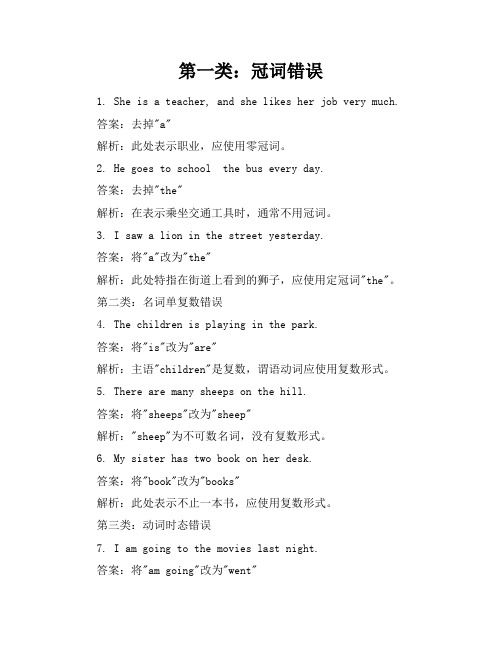
第一类:冠词错误1. She is a teacher, and she likes her job very much.答案:去掉"a"解析:此处表示职业,应使用零冠词。
2. He goes to school the bus every day.答案:去掉"the"解析:在表示乘坐交通工具时,通常不用冠词。
3. I saw a lion in the street yesterday.答案:将"a"改为"the"解析:此处特指在街道上看到的狮子,应使用定冠词"the"。
第二类:名词单复数错误4. The children is playing in the park.答案:将"is"改为"are"解析:主语"children"是复数,谓语动词应使用复数形式。
5. There are many sheeps on the hill.答案:将"sheeps"改为"sheep"解析:"sheep"为不可数名词,没有复数形式。
6. My sister has two book on her desk.答案:将"book"改为"books"解析:此处表示不止一本书,应使用复数形式。
第三类:动词时态错误7. I am going to the movies last night.答案:将"am going"改为"went"解析:句子描述的是过去的事情,应使用一般过去时态。
8. They have finished their homework and go home.答案:将"go"改为"went"解析:根据上下文,这里应该使用过去时态,与前面的"finished"保持一致。
英语常出现的错误总结归纳
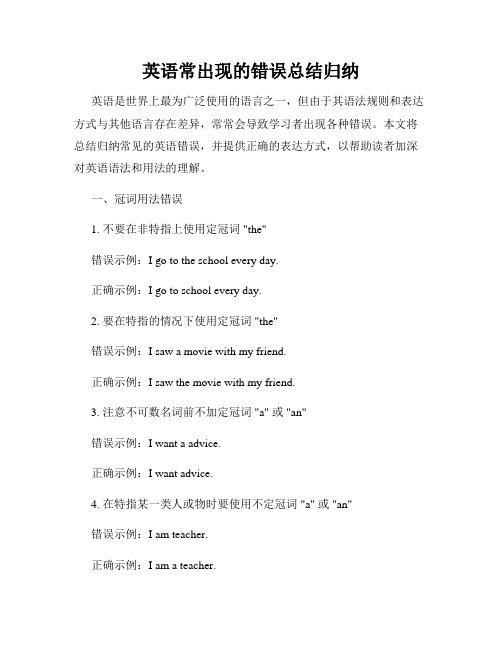
英语常出现的错误总结归纳英语是世界上最为广泛使用的语言之一,但由于其语法规则和表达方式与其他语言存在差异,常常会导致学习者出现各种错误。
本文将总结归纳常见的英语错误,并提供正确的表达方式,以帮助读者加深对英语语法和用法的理解。
一、冠词用法错误1. 不要在非特指上使用定冠词 "the"错误示例:I go to the school every day.正确示例:I go to school every day.2. 要在特指的情况下使用定冠词 "the"错误示例:I saw a movie with my friend.正确示例:I saw the movie with my friend.3. 注意不可数名词前不加定冠词 "a" 或 "an"错误示例:I want a advice.正确示例:I want advice.4. 在特指某一类人或物时要使用不定冠词 "a" 或 "an"错误示例:I am teacher.正确示例:I am a teacher.二、时态和语态错误1. 使用一般过去时表示现在的动作错误示例:Yesterday, I go to the library.正确示例:Yesterday, I went to the library. 2. 使用现在进行时表示未来的动作错误示例:I am meeting my friend tomorrow.正确示例:I will meet my friend tomorrow.3. 使用被动语态时要注意动词形式的变化错误示例:The cake made by me.正确示例:The cake was made by me.三、动词形式错误1. 不要在动词后面加 "-s" 形成复数形式错误示例:He go to school every day.正确示例:He goes to school every day.2. 使用不正确的动词时态错误示例:I have went to the supermarket.正确示例:I have gone to the supermarket.3. 不要忽略动词不定式 "to"错误示例:I want go home.正确示例:I want to go home.四、形容词和副词的用法错误1. 不要使用形容词修饰动词错误示例:He speaks English good.正确示例:He speaks English well.2. 不要使用形容词修饰名词错误示例:I have a happy news to tell you.正确示例:I have happy news to tell you.3. 注意副词在句中的位置错误示例:I always late for school.正确示例:I am always late for school.五、介词用法错误1. 注意介词的正确搭配错误示例:I am interested in for learning English.正确示例:I am interested in learning English.2. 介词后使用动词原形错误示例:I am good at to play basketball.正确示例:I am good at playing basketball.六、固定搭配和习惯用语错误1. 注意习惯用语的正确使用错误示例:I made my homework.正确示例:I did my homework.2. 注意固定搭配的正确表达方式错误示例:I go to the bed.正确示例:I go to bed.七、词汇使用错误1. 不要使用同音异义词错误替换错误示例:I read a new book yesterday.正确示例:I read a new newspaper yesterday.2. 注意动词和名词的不同用法错误示例:I have a look to the picture.正确示例:I take a look at the picture.综上所述,英语学习中常见的错误包括冠词用法错误、时态和语态错误、动词形式错误、形容词和副词的用法错误、介词用法错误、固定搭配和习惯用语错误以及词汇使用错误等。
初中英语常见语法错误
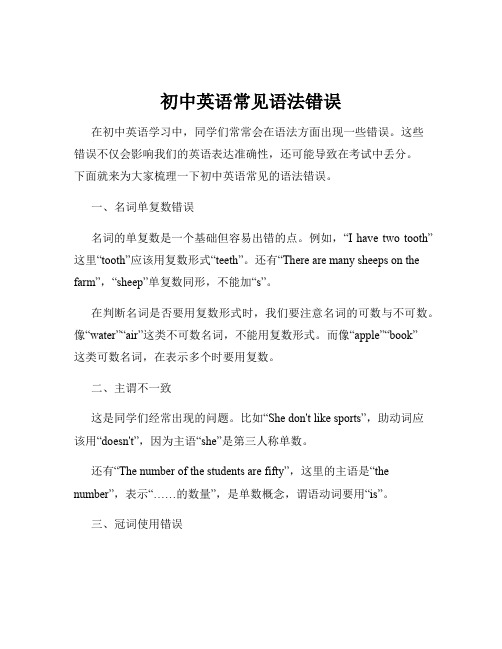
初中英语常见语法错误在初中英语学习中,同学们常常会在语法方面出现一些错误。
这些错误不仅会影响我们的英语表达准确性,还可能导致在考试中丢分。
下面就来为大家梳理一下初中英语常见的语法错误。
一、名词单复数错误名词的单复数是一个基础但容易出错的点。
例如,“I have two tooth”这里“tooth”应该用复数形式“teeth”。
还有“There are many sheeps on the farm”,“sheep”单复数同形,不能加“s”。
在判断名词是否要用复数形式时,我们要注意名词的可数与不可数。
像“water”“air”这类不可数名词,不能用复数形式。
而像“apple”“book”这类可数名词,在表示多个时要用复数。
二、主谓不一致这是同学们经常出现的问题。
比如“She don't like sports”,助动词应该用“doesn't”,因为主语“she”是第三人称单数。
还有“The number of the students are fifty”,这里的主语是“the number”,表示“……的数量”,是单数概念,谓语动词要用“is”。
三、冠词使用错误不定冠词“a”和“an”的使用经常被混淆。
“a”用于辅音音素开头的单词前,“an”用于元音音素开头的单词前。
例如,“This is a useful book”,“useful”虽然是以元音字母“u”开头,但发音是辅音音素,所以用“a”。
定冠词“the”的使用也有规则。
表示特指、独一无二的事物、上文提到过的事物等时要用“the”。
但很多同学会随意使用或者漏用。
四、形容词和副词的误用形容词用来修饰名词,副词用来修饰动词、形容词或其他副词。
比如“He runs quick”,“quick”是形容词,这里应该用副词“quickly”来修饰动词“runs”。
还有“She is very beautiful How beautiful she is!”,第一个“beautiful”是形容词,作表语;第二个“beautiful”是形容词,在感叹句中作中心词。
初中语法纠错学生常见语法错误整理

初中语法纠错学生常见语法错误整理初中语法纠错-学生常见语法错误整理在初中阶段,语法是一个重要的学习内容,掌握好语法规则对于学生的写作和英语学习能力有着积极的影响。
然而,学生常常会犯一些常见的语法错误。
本文将对常见的语法错误进行整理,并提供纠正方法,帮助学生改进语法表达能力。
一、名词性从句的错误1. 主语从句错误:原句错误示例:What he likes to do is playing basketball.改正后:What he likes to do is play basketball.2. 宾语从句错误:原句错误示例:I don't know what should I do.改正后:I don't know what I should do.3. 表语从句错误:原句错误示例:The problem is what you can't solve.改正后:The problem is what you can't solve.4. 定语从句错误:原句错误示例:The girl who I talked is my friend.改正后:The girl whom I talked to is my friend.二、动词时态和语态错误1. 一般现在时与现在进行时错误:原句错误示例:He is go shopping now.改正后:He is going shopping now.解释:现在进行时用于表示此刻正在进行的动作。
2. 一般过去时与过去进行时错误:原句错误示例:I was watched TV yesterday.改正后:I was watching TV yesterday.解释:过去进行时用于表示过去某个时间段正在进行的动作。
3. 一般将来时错误:原句错误示例:We will be having a meeting at 3 p.m. tomorrow.改正后:We are going to have a meeting at 3 p.m. tomorrow.解释:一般将来时用于表示将来某个时间点要发生的动作。
中考英语句式易错易混点整理

中考英语句式易错易混点整理一、时态误用1.一般现在时与现在进行时混淆易错点:考生常将表示经常性、习惯性动作的一般现在时与表示正在进行的动作的现在进行时混淆。
例句:错误:I am having a headache always.(我总是头疼。
)正确:I always have a headache.(我总是头疼。
)翻译:我总是头疼。
2.一般过去时与过去进行时混淆易错点:在描述过去某个时间点正在进行的动作时,考生容易误用一般过去时。
例句:错误:When I got home, my mother cooked dinner.(当我到家时,我妈妈正在做饭。
)正确:When I got home, my mother was cooking dinner.(当我到家时,我妈妈正在做饭。
)翻译:当我到家时,我妈妈正在做饭。
二、语态错误1.主动语态与被动语态混淆易错点:考生往往不清楚何时应使用被动语态,尤其是在描述动作的承受者时。
例句:错误:They built the bridge last year.(这座桥去年被他们建造了。
)正确(如需强调桥被建造):The bridge was built by them last year.(这座桥去年被他们建造了。
)翻译:这座桥去年被他们建造了。
2.不及物动词误用被动语态易错点:不及物动词没有宾语,因此不能用于被动语态。
例句:错误:The book is read by him.(这本书被他读了。
)正确:He read the book.(他读了这本书。
)翻译:他读了这本书。
三、从句用法不当1.定语从句与状语从句混淆易错点:考生常将定语从句和状语从句的引导词混淆,导致句子意思不清。
例句:错误:This is the house where I lived for five years.(这是我住了五年的家。
)正确(如需表达“我住了五年的那个家”):This is the house that/which I lived in for five years.(这是我住了五年的那个家。
初中英语考试最常出现的100个错误学生版

初中英语考试最常出现的100个错误,你都犯过吗?考试是对运用英语的综合能力的考查,同学们在考试的过程当中会经常暴露一些弱点、犯一些错误。
今天就将这些考试的常见错误按语法类别进行归纳,并举以实例,希望大家能够由此发现自己的问题并及时改正!一、名词写作中,同学们常把握不好名词的数、所有格以及一些集合名词的用法。
1. He gave me a very good advice yesterday.2. That girl loves reading book.3. He went into a book’s shop and bought a dictionary.4. My family is watching TV.5. I bought some potatos and tomatos at the supermarket.6. This has nothing to do with their believes.二、冠词7. The boss wants to hire an useful person.8. Plane is a machine that can fly.9. He played a piano at the party yesterday.10. The machine was invented in 1920s.11. Xiao Hong went to school by the bus every day.三、代词使用代词时请注意其单、复数,主、宾格以及形容词性物主代词和名词性物主代词的用法。
12. He is one of those speakers who make his ideas perfectly clear.13. Whom do you think has left the lights on?14. The boss pretended not to see John and I.15. These books are mine; those in the bag are her.四、数词16. There are fourteen hundreds students in our school.17. Their school is twice as larger as our school.18. Today’s homework is a five-hundred-words composition.19. Two third of the students in our school are from America.五、形容词和副词形容词和副词容易被误用,形容词和副词的比较级和最高级也是应注意的重点。
初中英语语法易错100题[最新]
![初中英语语法易错100题[最新]](https://img.taocdn.com/s3/m/06344865ac02de80d4d8d15abe23482fb4da02e2.png)
初中英语语法易错100题[最新]初中语法易错 100 题1. Some students were afraid in class because they thought their classmates might laugh at them.A of speakB to speakC speakD to speaking2. I found difficult to learn English grammar.A itB thatC it isD that is3. He decided _school late again.A to comeB don‘t comeC come not toD not to come to4. She needs a partnerA to practice English withB practicing EnglishC to practicing English withD practice English with5. Stop chatting. I have to tell you.A anything importantB something importantC important anythingD important something6. I t‘s good that have their own ideas about life as well asabout being cool.A the youngB youthC the young manD young7. My grandfather me stories when I was young.A was used to tellB is used to tellingC used to tellD used to telling8. When I was a student, I was used to at six.A get upB getting upC gets upD got up9. It is of a problem to be poor than to be dishonest.A moreB littleC lessD much10. My brother is to carry the heavy box by himself.A old enoughB enough oldC enough strongD strong enough11. I must get my homework ,A doneB doesC doD did12. People are not allowed in the cinema, but they will allow in the rest room.A to smoke, smokeB smoking, to smokeC to smoke, smokingD smoking, smoke13. The music soundsA wellB nicelyC goodD beautifully14. to improve our English?A What do you think we should doB Do you think what do we shouldC What do you think should weD Do you think what should we do15. His bike is broken. It needs _soon.A be repairB to mendC to be repairedD being mend16. Three more men to do the work every day.A were neededB needC are needingD are needed17. He is against computer games.A playingB playsC playD to play18. He was too hungry, so he ate in the evening.A plenty ofB a lot ofC manyD a lot19. I don‘t know .A what to do itB how to doC what to doD to do what20. ---I don‘t k now if I anyone at the party this evening.---If I anyone, I will get nervous.A will know, won‘t knowB will know, don‘t knowC know, won‘t knowD know, don‘t know21. Tom is unwilling to speak in public.A theB aC anD /22. The professor always has good solutions others‘ p roblems.A ofB toC withD about23. If you take my , please don‘t tell about it.A advice, anyB advices, someC advices, someoneD advice, anyone24. They are hardly ever tired, they?A areB aren‘tC willD won‘t25. I‘l l have a test writing next week.A atB ofC onD in26. If you have any ideas , please return them to him.A whose gloves are theseB whose gloves is thisC whose gloves these areD whose gloves this is27. has been found out oil food is bad for our healthA That, thatB That, whatC It, whatD It, that28. I prefer music that great lyrics.A haveB hasC there isD there are29. I only eat food that tastes .A wellC goodD deliciously30. The Green family would like to for about three weeks.A leave homeB go outC come to ChinaD be away31. I hope _have a happy year in our class.A you toB or youC to youD you32. The two men walked the forest and got to a small house.A acrossB throughC crossingD over33. The girl her mother. I know her mother likes reading, too.A takes afterB looks afterC similarD takes care34. Don‘t put off to see the doctor when you are ill.A goB to goC goingD gone35. He spent every Sunday morning in an old people‘s home.B workingC workedD works36. He to read, so he always puts his to good use by working in the after- school care center at his elementary school.A love, lovesB loves, loveC loving, lovingD loves, loves37. The sudden rain made for the singers to put on performances.A that possibleB that impossibleC it possibleD it impossible38. ill, I can‘t go to school today.A Because ofB AsC BeingD With39. This watch China.A was made inB was made byC was made fromD was made of40. our football team won.A By the endB In the endC At the end ofD Final41. The headmaster announced that there would an English speech contest next month.A haveB hasC to haveD be42. Did you go to the movie with Lucy? No, IA didn‘t inviteB wasn‘t invitedC hadn‘t invitedD wasn‘t inviting43. –Excuse me, could you tell me ? ---Of courseA when had the train left the stationB where is the nearest the hospitalC if it will be windy tomorrowD how much did the car cost44. ---Must I do my homework?--- No you .A mustn‘tB can‘tC needn‘tD won‘t45. ---I don‘t know the homework.---You could ask your teacher for help.A how to doB what to doC why to doD who to do46. Tom asked his friend .A not to be so angryB that knowledge is power.C when did he come backD where was he born47. I think it is a little difficult to remember the English words.A thatB whichC thisD them48 What are you nervous , Jenny?A inB atC onD about49. We should that.A thinking ofB thought ofC have thought ofD have thinking of50. Don‘t get when you listen t o the old.A boredB boringC tiringD excited51. I don‘t like the people who always keep me .A waitB waitingC to waitD waited52. ---Do you like loud music?---I am often want to leave by it.A madeB made toC makingD making to53. The pen doesn‘t work. I need to buy a new one to writeA with Bin C on D /54. ---You want to improve your spoken English. Why an English language club?---Good idea.A don‘t joinB not joinC not to joinD not you join55.If you have some trouble the railway station, please ask the police for help.A findingB finding outC looking forD discovering56. ---I don‘t know I should do with so many eggs.。
中考英语语法易错点100例
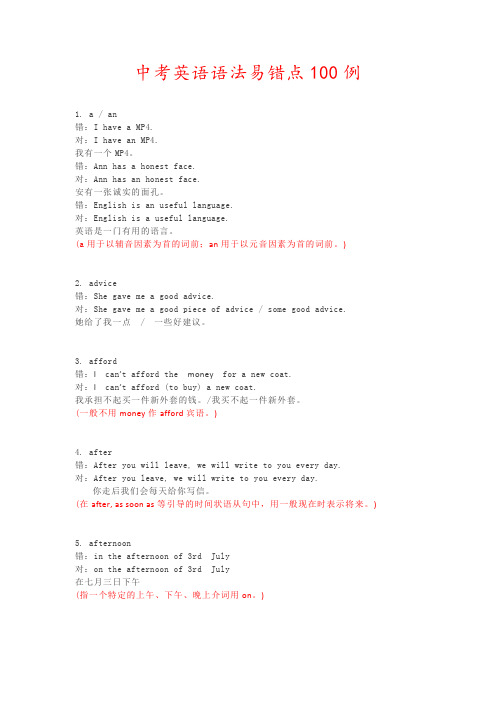
中考英语语法易错点100例1. a / an错:I have a MP4.对:I have an MP4.我有一个MP4。
错:Ann has a honest face.对:Ann has an honest face.安有一张诚实的面孔。
错:English is an useful language.对:English is a useful language.英语是一门有用的语言。
(a用于以辅音因素为首的词前;an用于以元音因素为首的词前。
)2. advice错:She gave me a good advice.对:She gave me a good piece of advice / some good advice.她给了我一点/ 一些好建议。
3. afford错:I can’t afford the money for a new coat.对:I can’t afford (to buy) a new coat.我承担不起买一件新外套的钱。
/我买不起一件新外套。
(一般不用money作afford宾语。
)4. after错:After you will leave, we will write to you every day.对:After you leave, we will write to you every day.你走后我们会每天给你写信。
(在after, as soon as等引导的时间状语从句中,用一般现在时表示将来。
)5. afternoon错:in the afternoon of 3rd July对:on the afternoon of 3rd July在七月三日下午(指一个特定的上午、下午、晚上介词用on。
)6. all错:We all were delighted when we heard the news.对:We were all delighted when we heard the news.我们听到这个消息都很高兴。
中学生英语学习常见错误一览表5
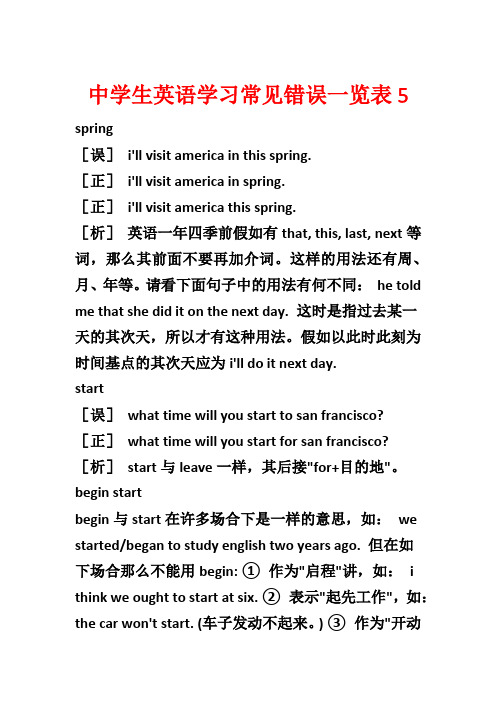
中学生英语学习常见错误一览表5 spring[误]i'll visit america in this spring.[正]i'll visit america in spring.[正]i'll visit america this spring.[析]英语一年四季前假如有that, this, last, next等词,那么其前面不要再加介词。
这样的用法还有周、月、年等。
请看下面句子中的用法有何不同:he told me that she did it on the next day. 这时是指过去某一天的其次天,所以才有这种用法。
假如以此时此刻为时间基点的其次天应为i'll do it next day.start[误]what time will you start to san francisco?[正]what time will you start for san francisco?[析]start与leave一样,其后接"for+目的地"。
begin startbegin与start在许多场合下是一样的意思,如:we started/began to study english two years ago. 但在如下场合那么不能用begin: ① 作为"启程"讲,如:i think we ought to start at six. ② 表示"起先工作",如:the car won't start. (车子发动不起来。
) ③ 作为"开动"、"启动"讲,如:do you know how to start this machine.still[误]oh, it is still raining now.[正]oh, it is still raining.[析]因still即包含有此时此刻仍旧如何,所以now 是多余词。
八年级上册英语常见失误100道

八年级上册英语常见失误100道本文将介绍八年级上册英语中常见的100个错误。
供学生参考,以帮助他们在研究中避免这些错误。
词汇1. 将“I”和“my”混淆2. 将“a”和“an”混淆3. 将“there”和“their”混淆4. 无法正确使用形容词和副词5. 错误使用“much”和“many”6. 未能正确使用代词语法7. 使用错误的时态8. 将“do”和“did”混淆9. 错误的主谓一致10. 非并列连词错误使用11. 使用错误的单复数形式12. 误用代词13. 非限制性从句中缺少逗号或未使用正确的逗号14. 错误使用介词15. 在 "there is"和 "there are"的使用上犯错误拼写16. 拼写错误的基本单词17. 拼写错误的可数名词18. 拼写错误的不可数名词19. 拼写易混淆的单词20. 添加了多余的字母或省略了字母用法错误21. 错误地使用动词22. 误用形容词和副词23. 随意使用情态动词24. 错误的介词用法25. 误用同音词26. 在使用倒装语法时犯错误句子结构27. 句子结构不完整或不正确28. 没有句子的主语和谓语29. 复合句中的子句之间没有正确的标点30. 意思不明确的句子结构表达错误31. 没有正确地传达意思32. 随意切换语法33. 意思不完整或不明确34. 没有正确执行翻译35. 在单词和语法之间没有正确的关联听力和口语36. 没有正确理解听力37. 没有适当地把握口音38. 犯了通用的口语错误39. 犯了调音错误40. 犯了重读错误阅读和写作41. 阅读速度太慢42. 没有正确理解文章43. 在词汇和语法方面有困难44. 写作水平过低45. 没有写出清晰的表达语音和发音46. 没有发出正确语音47. 不能正确准确地重复单词48. 几个音节的单词发音错误49. 没有考虑到音素残留50. 犯语音重读错误数字和日期51. 多位数字写错52. 写小数形式不正确53. 使用“+”和“-”符号时写错54. 按顺序写日期出错55. 写错了24小时时间格式研究和记忆56. 难以记住单词57. 研究同音异义词时出错58. 理解混淆的词汇59. 在研究语法时陷入迷惑60. 在研究角色时有困难沟通和表达自己61. 忘记化解语法困境62. 无法自由的表达思想63. 用自己的语言思考64. 在沟通中有障碍65. 没有以合适的方式表达思想建立信心66. 没有足够的信心67. 难以理解英语文化68. 在进行口语时陷入困境69. 在听力时出现困难70. 在写作时出现困难掌握技巧71. 判断速度不够快72. 没有适当掌握基础知识73. 区分口语和一般表达74. 在研究方式上出现错误75. 研究焦虑过高学生态度76. 沉溺于中文思考77. 研究英语时不够专注78. 研究英语时缺乏兴趣79. 在研究上缺乏耐心80. 缺乏自觉性和自我驱动阅读技能81. 阅读时没有意识到上下文82. 阅读时不能准确地理解难点83. 阅读速度太慢84. 阅读理解能力差85. 阅读临考时出现紧张情绪语言表达86. 声音和语调不准确87. 口齿含糊,说话语气轻柔或刺耳88. 过度使用缩略语和别名89. 没有针对目标观众系列话题90. 在解答问题时过于迂回简单单词使用能力91. 多义词单词的使用能力差92. 不能适当使用英文翻译93. 没有为记忆单词创造合适的机会94. 难以观察单词和短语的变化95. 没有掌握时间状语从句句子结构和拼写96. 没有理解重要的句子结构97. 句子没有合理地实现转换98. 对复合句子理解不足99. 不熟悉单词拼写100. 对句子不加以注意以上是本文汇总的八年级上册英语常见的100个错误。
英语初中典型错句总结归纳
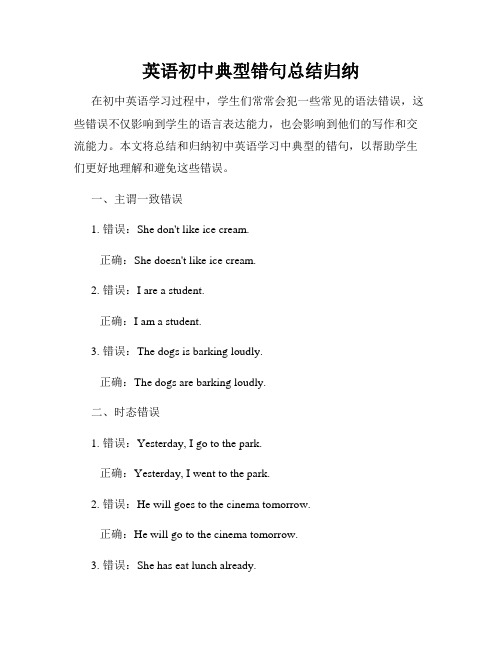
英语初中典型错句总结归纳在初中英语学习过程中,学生们常常会犯一些常见的语法错误,这些错误不仅影响到学生的语言表达能力,也会影响到他们的写作和交流能力。
本文将总结和归纳初中英语学习中典型的错句,以帮助学生们更好地理解和避免这些错误。
一、主谓一致错误1. 错误:She don't like ice cream.正确:She doesn't like ice cream.2. 错误:I are a student.正确:I am a student.3. 错误:The dogs is barking loudly.正确:The dogs are barking loudly.二、时态错误1. 错误:Yesterday, I go to the park.正确:Yesterday, I went to the park.2. 错误:He will goes to the cinema tomorrow.正确:He will go to the cinema tomorrow.3. 错误:She has eat lunch already.正确:She has eaten lunch already.三、冠词错误1. 错误:I want a apple.正确:I want an apple.2. 错误:Can you give me the newspaper?正确:Can you give me a newspaper?3. 错误:He is in the school today.正确:He is at school today.四、介词错误1. 错误:I am good in math.正确:I am good at math.2. 错误:He is waiting on the bus stop.正确:He is waiting at the bus stop.3. 错误:She is angry with me on my lateness.正确:She is angry with me about my lateness.五、动词用法错误1. 错误:I want to drink water.正确:I want to drink some water.2. 错误:They are all very interesting in playing volleyball.正确:They are all very interested in playing volleyball.3. 错误:I can to swim.正确:I can swim.六、连词错误1. 错误:I like playing basketball, or to play soccer.正确:I like playing basketball, but I don't like playing soccer.2. 错误:He didn't come to school yesterday because he was sick.正确:He didn't come to school yesterday because of his illness.七、代词错误1. 错误:He is going to the park, and he bring his friend with us.正确:He is going to the park, and he is bringing his friend with him.2. 错误:My sister and me are going to the party.正确:My sister and I are going to the party.八、语态错误1. 错误:The window is broken by him.正确:He broke the window.2. 错误:The cake was made by my mother yesterday.正确:My mother made the cake yesterday.以上是初中英语学习中常见的典型错句的总结归纳。
初中英语易错100道
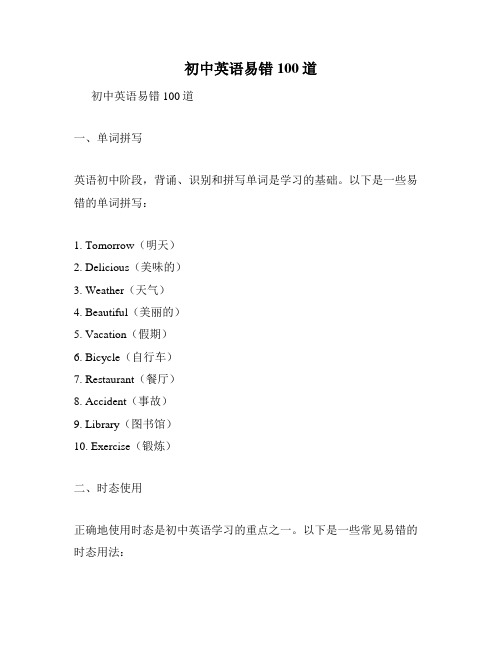
初中英语易错100道初中英语易错100道一、单词拼写英语初中阶段,背诵、识别和拼写单词是学习的基础。
以下是一些易错的单词拼写:1. Tomorrow(明天)2. Delicious(美味的)3. Weather(天气)4. Beautiful(美丽的)5. Vacation(假期)6. Bicycle(自行车)7. Restaurant(餐厅)8. Accident(事故)9. Library(图书馆)10. Exercise(锻炼)二、时态使用正确地使用时态是初中英语学习的重点之一。
以下是一些常见易错的时态用法:1. She goes to school every day.(她每天去上学。
)2. I saw a movie yesterday.(昨天我看了一部电影。
)3. They are playing basketball now.(他们正在打篮球。
)4. Mom is cooking dinner in the kitchen.(妈妈正在厨房做晚餐。
)5. He will visit his grandparents next week.(下周他将去看望他的祖父母。
)三、动词用法正确使用动词是避免易错的关键。
以下是一些常见易错的动词用法:1. I can swim.(我会游泳。
)2. He likes playing soccer.(他喜欢踢足球。
)3. She is studying in the library.(她正在图书馆学习。
)4. They want to eat pizza for dinner.(他们想吃比萨饼做晚餐。
)5. We should do homework every day.(我们应该每天做作业。
)四、名词单复数正确使用名词的单复数形式也是初中英语易错的地方之一。
以下是一些常见易错的名词单复数形式:1. There are two dogs in the park.(公园里有两只狗。
初中英语考试最常出现的100个错误

初中英语考试最常出现的100个错误,你都犯过吗?写作中,同学们常把握不好名词的数、全部格以及一些集合名词的用法。
1.He gave me a very good advice yesterday.句中的a要去掉,因为advice是不可数名词。
一些汉语概念为可数的词在英语中却是不可数的,表示数量时在其前加a piece of ,类似的词有:news, bread, work, paper, chalk, furniture, information 等等。
2.That girl loves reading book.可数名词单数不能孤零零地放在句子里,或前面加冠词,或将其变为复数。
此处最好变为books.3.He went into a book's shop and bought a dictionary.一般表示有生命的东西的名词的全部格用's ,如my mothers car,而此处适宜用名词修饰名词,改为a book shop.4.My family is watching TV.一些集合名词如看成一个整体,则用单数的谓语动词,如My family is a happy one;如强调集合中每个个体的个人行为,则用复数的谓语动词。
此处看电视是个体行为,应把is改为are。
类似的词有:team, class, audience等。
5.I bought some potatos and tomatos at the supermarket.中学阶段以结尾的名词中有四个词变复数时要加es ,它们是tomato, potato, Negro, hero;其余的都加s变为复数。
6.This has nothing to do with their believes.[这和他们的X 没关系。
〕以f, fe结尾的词变为复数时一般去f, fe加ves ,如knife-knives, thief- thieves; 而roof和belief直接加s变为复数。
初中英语考试中常见小错误
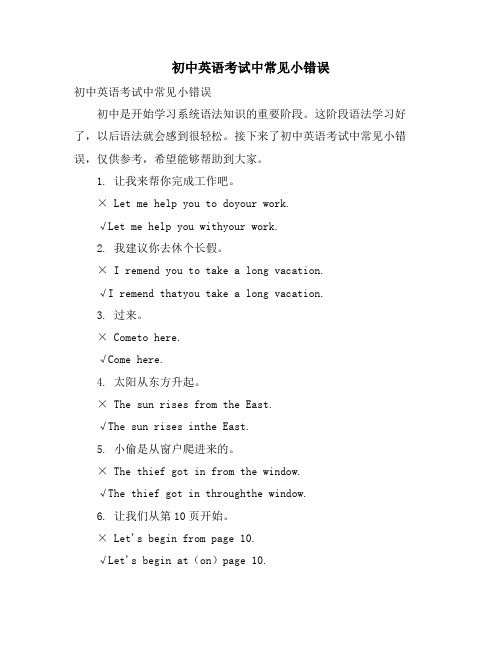
初中英语考试中常见小错误初中英语考试中常见小错误初中是开始学习系统语法知识的重要阶段。
这阶段语法学习好了,以后语法就会感到很轻松。
接下来了初中英语考试中常见小错误,仅供参考,希望能够帮助到大家。
1. 让我来帮你完成工作吧。
× Let me help you to doyour work.√Let me help you withyour work.2. 我建议你去休个长假。
× I remend you to take a long vacation.√I remend thatyou take a long vacation.3. 过来。
× Cometo here.√Come here.4. 太阳从东方升起。
× The sun rises from the East.√The sun rises inthe East.5. 小偷是从窗户爬进来的。
× The thief got in from the window.√The thief got in throughthe wind ow.6. 让我们从第10页开始。
× Let's begin from page 10.√Let's begin at(on)page 10.7. 我耐心有限。
× There is a limit in my patience.√There is a limit to my patience.8. 请在白线内等待。
× Please wait inside the white line.√Please wait behind the wh ite line.9. 你家房子买了火险吗?× Is your house insured for fire?√Is your house insured againstfire?10. 我没地方住。
中考英语100句子改错

中考•语法|考生最容易犯的100个语法错误,现在改正还来得及!写作中,学生们常常掌握不好名词的可数性、所有格以及一些集合名词的用法。
1。
He gave me a very good advice yesterday.句中的a要去掉,因为advice是不可数名词.一些汉语概念为可数的词在英语中却是不可数的,表示数量时在其前加a piece of,类似的词有:news,bread,work, paper, chalk, furniture, information等等.2。
That girl loves reading book.可数名词单数不能孤零零地放在句子里,或前面加冠词,或将其变为复数.此处最好变为books.3。
He went into a book’s shop and bought a dictionary。
一般表示有生命的东西的名词的所有格用’s,如my mother’s car, 而此处适宜用名词修饰名词,改为a book shop。
4。
My family is watching TV.一些集合名词如看成一个整体,则用单数的谓语动词,如My family is a happy one;如强调集合中每个个体的个人行为,则用复数的谓语动词.此处看电视是个体行为,应把is改为are。
类似的词有:team,class, audience等。
5。
I bought some potatos and tomatos at the supermarket.中学阶段以“o”结尾的名词中有四个词变复数时要加es,它们是tomato,potato,Negro, hero; 其余的都加s变为复数。
6.This has nothing to do with their believes。
(这和他们的信仰没关系。
)以f, fe 结尾的词变为复数时一般去f, fe 加ves,如knife—knives,thief—thieves; 而roof 和belief直接加s变为复数。
- 1、下载文档前请自行甄别文档内容的完整性,平台不提供额外的编辑、内容补充、找答案等附加服务。
- 2、"仅部分预览"的文档,不可在线预览部分如存在完整性等问题,可反馈申请退款(可完整预览的文档不适用该条件!)。
- 3、如文档侵犯您的权益,请联系客服反馈,我们会尽快为您处理(人工客服工作时间:9:00-18:30)。
最新初中英语常见错误100例1. 老师对我很生气。
误:The teacher was angry to me.正:The teacher was angry with me.析:表示对某人生气,一般用介词with (有时也用at)。
表示对某事(物)生气,通常用介词at, about(在美国英语中也可以用with)。
2. 你寄出的信有回音没有?误:Have you had an answer of your letter?正:Have you had an answer to your letter?析:表示“对……的回答(答复)”,其后通常接介词to。
类似地,要表示“……的答案”,其后也接介词to:the answer to the exercises 练习答案3. 湖面结冰了,所以我们就从冰上走过。
误:The lake was frozen, so we walked through the ice.正:The lake was frozen, so we walked across the ice.析:across 和through 都可表示从一边到另一边的意思,但前者主要涉及平面(与on有关),而后者则主要涉及立体空间(与in 有关)。
4. 他不愿接受我的建议。
误:He wouldn’t get my advice.正:He wouldn’t take (follow, accept) my advice.析:表示接受意见或忠告,通常用动词take, follow, accept, act on等,但不能用get。
另外:提出建议或忠告,通常用动词give;表示向某人请教或征求意见,一般用动词ask (for)。
5. “你自己能修吗?”“恐怕不行。
”误:“Can you repair it yourself?” “I’m not afraid.”正:“Can you repair it yourself?” “I’m afraid not.”析:比较:I’m not afraid. 意为“我不怕”;I’m afraid not. 意为“恐怕不行”“恐怕不会”“恐怕不是”等(表示委婉的否定)。
6. 读罢此信,他哭了。
误:After reading the letter, tears ran down his cheeks.正:After he read the letter, tears ran down his cheeks.正:After reading the letter, he burst into tears.析:after引导动名词作状语时,其逻辑主语应与句子主语保持一致。
7. 我们班又有五个学生入了团。
误:Five students in our class joined the League again.正:Five more students in our class joined the League.正:Another five students in our class joined the League.析:again 表示“又”“再”,指动作的反复;more 或another表示“再”“又”,指数量在原有基础上的增加。
若以上误句要视为正句,则表示:我们班有五位同学又入了一次团,即第二次入团。
8. 她入党有十年了。
误:It is ten years ago since she joined the Party.正:It is ten years since she joined the Party.正:She joined the Party ten years ago.析:“It is + 一段时间+ since...”是一句型,意为“……有一段时间了”,注意不要在该结构的since 前用ago。
9. 他们同意我做这事。
误:They agreed me to do it.正:They agreed to let me do it. / They agreed to my doing it.析:不要按汉语习惯用agree sb to do sth 来表示“同意某人做某事”,要表达此意,需改用其他结构。
10.要是他这样说,那他就是个骗子。
误:If he said so, and he is a liar.正:If he said so, he is a liar.析:if 引导的是条件状语从句,后面的句子为主句,其前不能用并列连词and(否则全句为并列句)11.这双鞋不相配,一只大,一只小。
误:These shoes do not match; one is large and another is small.正:These shoes do not match; one is large and the other is small. 析:表示两者当中的另一个,要用the other,不用another。
12.今天下午我打过电话,但没人接听。
误:I telephoned this afternoon, but nobody received.正:I telephoned this afternoon, but nobody answered.析:表示接电话,英语习惯用动词answer。
顺便说一句,听见门铃或敲门声去开门,习惯上也用动词answer。
如:I knocked at the door ,but no one answered. 我敲了敲门,但没有人来开门。
13. 为什么不给她送些花呢?误:Why not give her any flowers?正:Why not give her some flowers?析:在表示请求或邀请的疑问句中,一般要用some,而不用any。
又如:Would you like some bananas? 吃香蕉吗?14.不久天空中出现了星星。
误:Soon the stars were appeared in the sky.误:Soon the sky appeared the stars.正:Soon the stars appeared in the sky.析:appear(出现)是不及物动词,因此其后不能有宾语,也不能用于被动语态。
15.她离开时,她的丈夫还在睡熟。
误:Her husband was very asleep when she left.正:Her husband was fast [sound] asleep when she left.析:要表示“睡得很熟”,asleep 不能用very 修饰,可用fast或sound 来修饰。
类似地还有:He’s in a sound sleep. 他睡得很香。
16. 他十分关心他的汽车。
误:He gives all his attentions to his car.正:He gives all his attention to his car.析:attention(注意)是不可数名词,不能用复数形式,也不能与不定冠词连用。
17.你的工作不好,但我的工作更糟。
误:Your work is bad, but mine is more bad.正:Your work is bad, but mine is worse.析:bad(坏的)的比较等级为不规则变化,即worse, worst。
使用时不要按汉语意思使用more bad这样的表达形式。
18. 因为下雨,所以我们只好呆在家里。
误:Because it was raining, so we had to stay at home.正:Because it was raining, we had to stay at home.正:It was raining, so we had to stay at home.析:because(因为)是从属连词,用以引导原因状语从句;而so(所以)是并列连词,用以连接并列句。
两者不可同用在一个句子中,改正的办法是:任意去掉其中的一个。
19. 他还是孩子时就开始喜欢诗歌。
误:He became to like poetry when he was a boy.正:He began to like poetry when he was a boy.析:表示开始做某事,英语可用begin [start] to do sth。
become 后习惯上不接不定式。
20. 躺在床上看书是个坏习惯。
误:It is a bad habit to read on bed.正:It is a bad habit to read in bed.正:It is a bad habit to read on a [the] bed.析:表示“在床上”,用介词on 或in 均可,但用on 时bed 前应有冠词,用in 时bed 前没有冠词。
但是若是指某一张具体的床,则也可能用两者,如:in [on] that bed (在那张床上),in [on] the same bed(在同一张床上)等。
另外,有时要暗示人身上盖有东西,也可能用in the bed。
21. “和我们一起玩好吗?”“谢谢,我非常愿意。
”误:“Will you join us?” “Thank you, my pleasure.”正:“Will you join us?” “Thank you, with pleasure.”析:my pleasure 主要用于回答感谢,其意为“别客气”“不用谢”;with pleasure 用于回答请求或邀请,其意为“好的”“没问题”“十分愿意”。
注:my pleasure 也可说成:It’s my pleasure. / It’s a pleasure. / Pleasure was all mine. / The pleasure is mine. 等。
22. 学生正在忙于准备期末考试。
误:The students are busy preparing the final examination.正:The students are busy preparing for the final examination.析:prepare sth=get sth ready(准备好某事),通常用于所需时间较短的动作;而prepare for sth=make preparations for sth(为某事作准备),通常用于所需时间较长的动作。
比较:prepare a meal=准备饭菜(指把饭菜煮好),prepare for a meal=为一顿饭作准备(可能包括买菜备酒等动作)。
